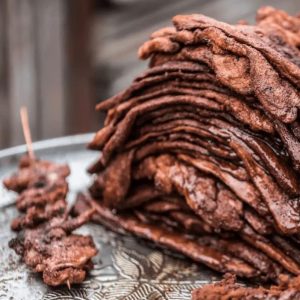Health
5 silent killer-foods Nigerians love
Published
10 months agoon
By
Ekwutos Blog
Nigerian cuisine is renowned for its rich flavors, vibrant colors, and diverse ingredients.
However, amid the array of delicious dishes, there are some foods that, despite their popularity, pose significant health risks.
Here are five silent killer foods that many Nigerians love:
1. Suya (Carcinogenic)

Suya
Suya, a spicy skewered meat popular across Nigeria, is a favorite street food enjoyed by many. However, this tasty delight comes with a hidden danger. The process of grilling meat at high temperatures can lead to the formation of carcinogenic compounds known as heterocyclic amines (HCAs) and polycyclic aromatic hydrocarbons (PAHs). These compounds have been linked to an increased risk of cancer. Regular consumption of suya, particularly when it is charred, can elevate this risk, making it a silent killer on the dinner table.
2. Shawarma (Due to Hot Dogs)

Shawarma
Shawarma, a Middle Eastern-inspired wrap filled with spiced meat, vegetables, and sauces, has become immensely popular in Nigeria. Often, hot dogs or other processed meats are used in the filling, which contain preservatives like nitrates and nitrites. These preservatives can convert into nitrosamines, which are carcinogenic. Furthermore, processed meats have been linked to various health issues, including heart disease and diabetes. Despite its delicious taste, frequent consumption of shawarma can contribute to these health problems.
3. Nkwobi (Excess Potassium)

Nkwobi
Nkwobi, a delicacy made from cow feet cooked in a spicy palm oil sauce, is a beloved traditional dish. However, it is also a silent killer due to its high potassium content. For individuals with kidney problems or those at risk of hyperkalemia (high potassium levels), consuming Nkwobi can be dangerous. Excess potassium can lead to irregular heartbeats and even heart failure. While it is a flavorful dish, those with existing health conditions need to be cautious about its consumption.
4. Kilishi

Kilishi
Kilishi, a dried, spicy meat similar to jerky, is another Nigerian favorite. The drying and seasoning process often involves adding a significant amount of salt, which can contribute to high blood pressure (hypertension). Although kilishi is a convenient and tasty snack, its high salt content makes it a silent threat to cardiovascular health.
5. Deep-Fried Snacks

Deep Fried Snacks (Akara)
Deep-fried snacks such as puff-puff, buns, akara (bean cakes), and plantain chips are immensely popular in Nigeria. These snacks, while delicious, are often cooked in unhealthy oils that contain trans fats. Trans fats are known to increase bad cholesterol (LDL) levels and decrease good cholesterol (HDL) levels, leading to an increased risk of heart disease, stroke, and type 2 diabetes. Additionally, the high-calorie content of deep-fried foods can contribute to obesity, which is a risk factor for numerous chronic diseases.
You may like


POLICE TO COMMENCE TRAINING FOR 10,000 NEW RECRUITS NATIONWIDE As IGP Charges Recruits on Police Reforms, Ethics and Professional Conduct


Moment helicopter crashed into Hudson River in New York (VIDEO)


APC Can’t Take Anambra Like Edo, Imo and Kogi— Gov Chukwuma Soludo


List of ambassadorial nominees not ready – Foreign Affairs Ministry


Condemn herdsmen’s activities in South – Ohanaeze ex-spokesperson, Ibegbu tells Northern govs


Nigeria losing big to ‘Japa’ trend, says Adesina
Health
NAFDAC Begins Gradual Reopening of Shops at Ogbo-Ogwu Drug Market in Onitsha
Published
9 hours agoon
April 11, 2025By
Ekwutos Blog
The National Agency for Food and Drug Administration and Control (NAFDAC) has commenced the gradual reopening of shops at the Ogbo-Ogwu drug market in Onitsha.
This development follows the agency’s closure of the market on February 10, 2025, due to concerns over the sale and distribution of counterfeit, unregistered, and substandard drugs.
The unsealing exercise is being led by a Deputy Director of NAFDAC, Mr. Tunji Omoyemi.
According to NAFDAC, traders whose shops meet the required safety and documentation standards are being cleared to resume business operations.
Addressing the traders, the market chairman, Mr. Ndubuisi Chukwulota, urged full cooperation with the agency to facilitate the swift resumption of commercial activities.



Credit: Anambra Broadcasting Service
Health
“We don’t train you and after spending all that money you leave our healthcare facilities” Gov Mbah begs nurses not to Japa
Published
14 hours agoon
April 11, 2025By
Ekwutos Blog
Enugu State Governor, Peter Mbah has appealed to nursing students in the state not to leave the state after graduation to curb brain drain in the state’s health sector.
The governor made the appeal during the 2024/ 2025 Maiden Matriculation Ceremony of the Nursing College, Enugu on Thursday, April 10.
He urged the students to consider the huge resources the state was committing in training nursing and midwifery students in the state and give back to the state after graduation.
Mbah, represented by the Secretary to the State Government (SSG), Prof. Chidiebere Onyia, said “japa syndrome” was completely against the policy of the state, who had been spending reasonable amount in training them.
“We don’t train you and after spending all that money in infrastructure and the first opportunity you get you leave our healthcare facilities.
“One thing we are very particular is how we improve the service conditions so that when you go through the effort of getting your certificate, you don’t leave our state.
“That is why we are training beyond just academics so that you see that this is service and if any of you can go back to our budget in 2024 and 2025, the highest investment is in education and health,” Mbah said.
Health
2025 RETREAT FOR HEALTH DIRECTORS’: PS URGES DIRECTORS’ TO UPHOLD TENETS OF EFFECTIVE SERVICE DELIVERY & SUCCESSION PLANNING
Published
2 days agoon
April 10, 2025By
Ekwutos Blog
Directors’ in the Federal Ministry of Health & Social Welfare have been urged to ensure effective delivery of services within the Health Sector to the Nigerian populace.
This is considered very critical to achieving the mandate of the Ministry, as well as ensuring purposeful succession planning to sustain the Ministry’s current achievements.
Permanent Secretary Daju Kachollom mni, stated during the retreat for Directors’ in the Ministry held at the Carlton Swiss Hotel Enugu, Enugu State.
The theme is ” Strengthening Leadership for Effective and Efficient Health and Social Welfare Governance.
Addressing Directors, Daju Kachollom highlighted the importannce and objectives of the retreat for effective and efficient provision of healthcare services.
The retreat, she stated, will involve strategic planning to assess the Ministry’s current position, set long-term goals and, outline the steps required to achieve them.
Additionally, it will also foster team building, strengthen interpersonal relationships among participants, improve communication and, encourage a collaborative environment.
While defining Leadership as a driving force behind organisations, the Permanent Secretary implores the Directors’ to prioritise transparency, embrace innovation, foster partnerships and, build empowered, sustainable teams to ensure an efficient and effective system that meets its goals.
“In this regard, we must fully embrace the on-going reforms and take ownership of them.
We must adopt the principles of the Federal Civil Service Strategy and Implementation Plan 2021–2025, with particular focus on the new Performance Management System (PMS), which is designed to track both individual performance and our collective contributions to ministerial and national development goals.
At its core, performance management aligns individual goals with Organizational objectives, ensuring a unifieɗ direction “; the Permanent Secretary added.
Additionally, Daju Kachollom urged Directors’ present at the retreat to prioritize mentoring and succession planning.
Mentoring and succession planning, according to her, are key initiatives to strengthen and sustain the progress achieved by the Ministry.
Major highlights of the retreat include power point presentations by the participating Directors’ in the Ministry, further affirming a deliberate intent of the top management
on enhancing leadership skills and, addressing challenges facing the Ministry while offering solutions to overcome them.

POLICE TO COMMENCE TRAINING FOR 10,000 NEW RECRUITS NATIONWIDE As IGP Charges Recruits on Police Reforms, Ethics and Professional Conduct

Moment helicopter crashed into Hudson River in New York (VIDEO)

APC Can’t Take Anambra Like Edo, Imo and Kogi— Gov Chukwuma Soludo
Trending

 Trending6 months ago
Trending6 months agoNYA demands release of ‘abducted’ Imo chairman, preaches good governance
- Business6 months ago
US court acquits Air Peace boss, slams Mayfield $4000 fine

 Politics6 months ago
Politics6 months agoMexico’s new president causes concern just weeks before the US elections
- Entertainment6 months ago
Bobrisky transferred from Immigration to FCID, spends night behind bars
- Entertainment6 months ago
Bobrisky falls ill in police custody, rushed to hospital

 Politics6 months ago
Politics6 months agoRussia bans imports of agro-products from Kazakhstan after refusal to join BRICS

 Politics6 months ago
Politics6 months agoPutin invites 20 world leaders
- Politics1 year ago
Nigerian Senate passes Bill seeking the establishment of the South East Development Commission.

